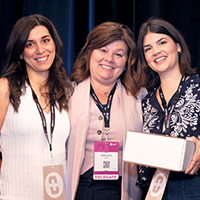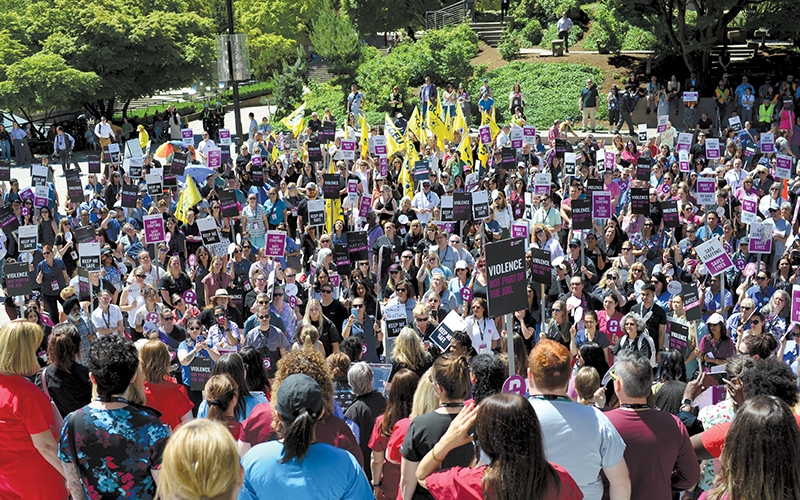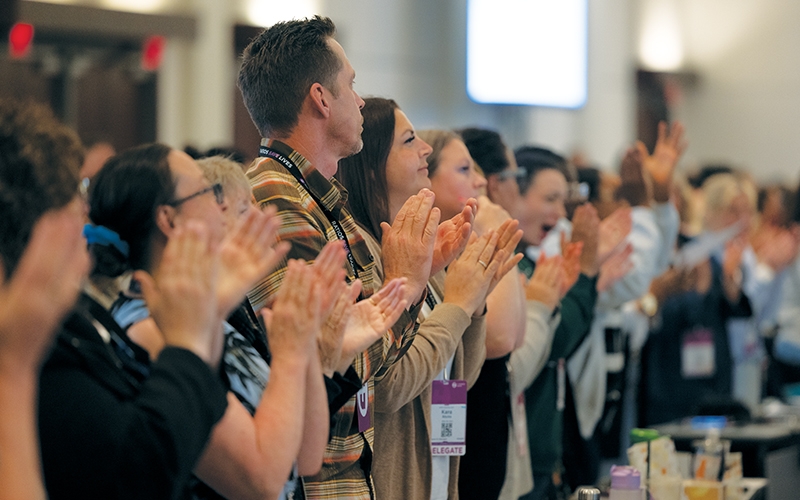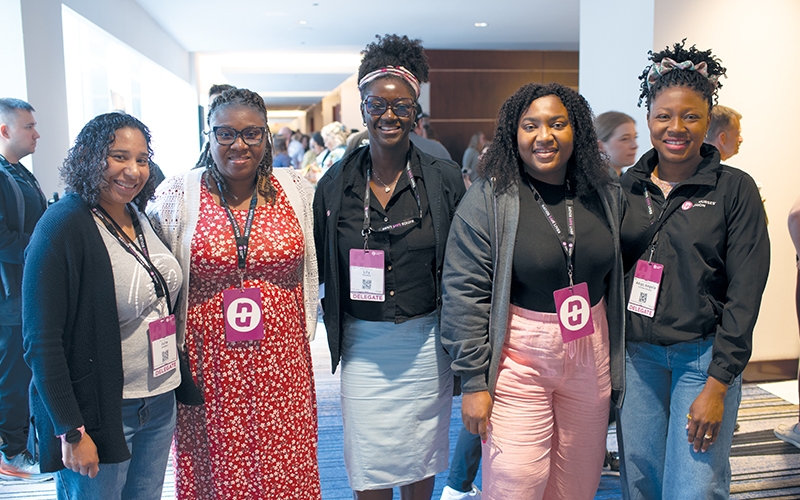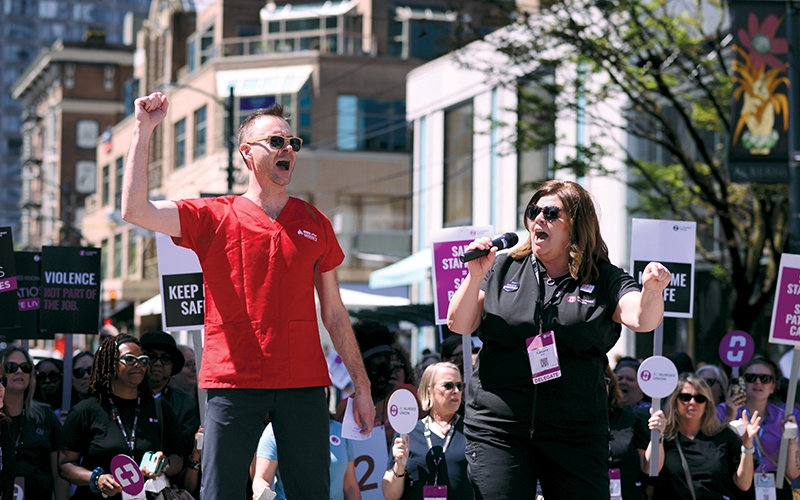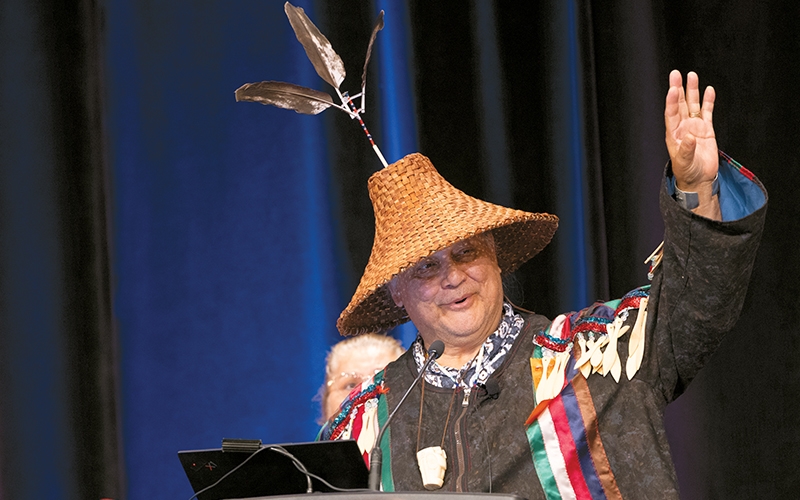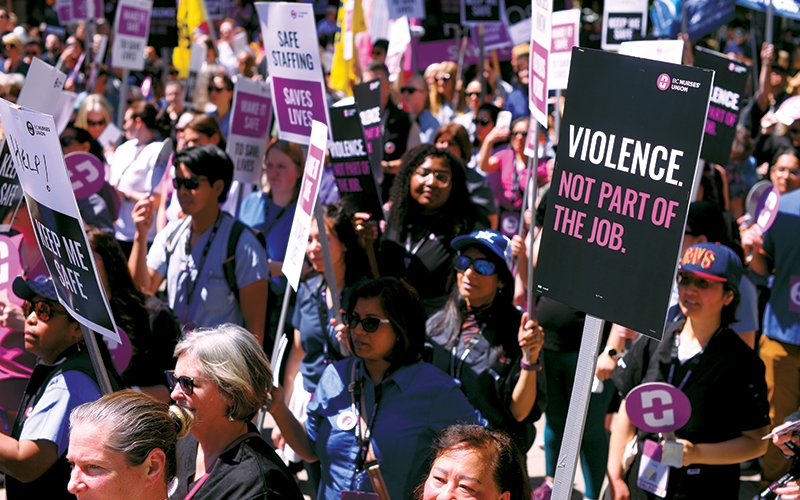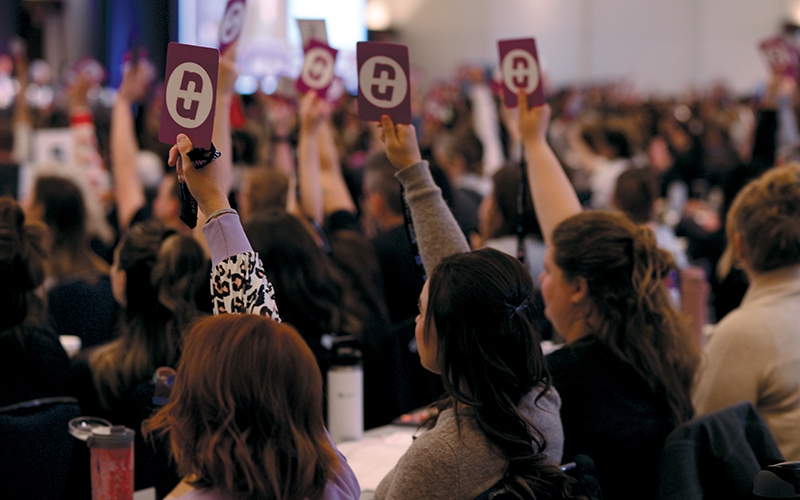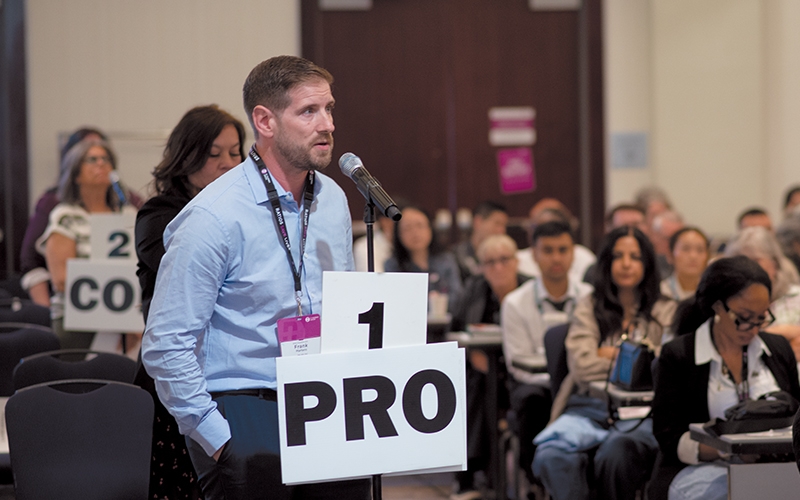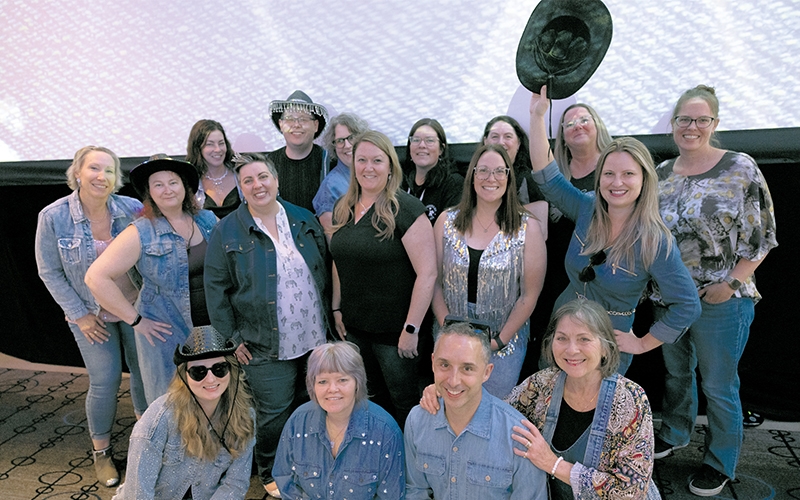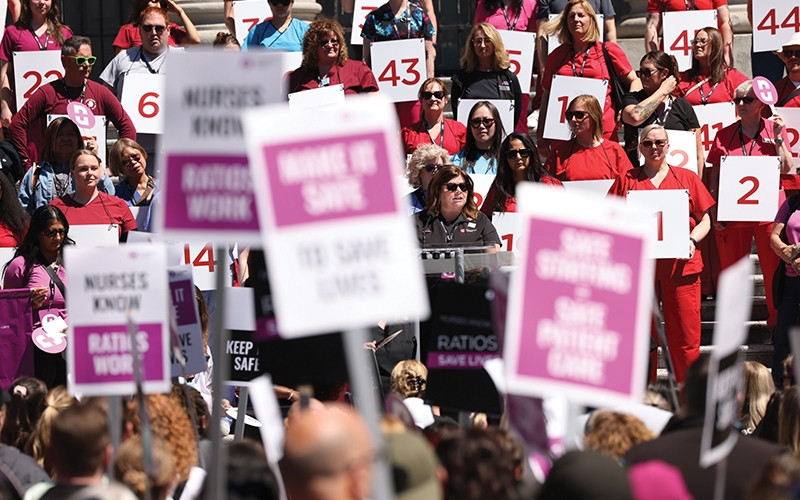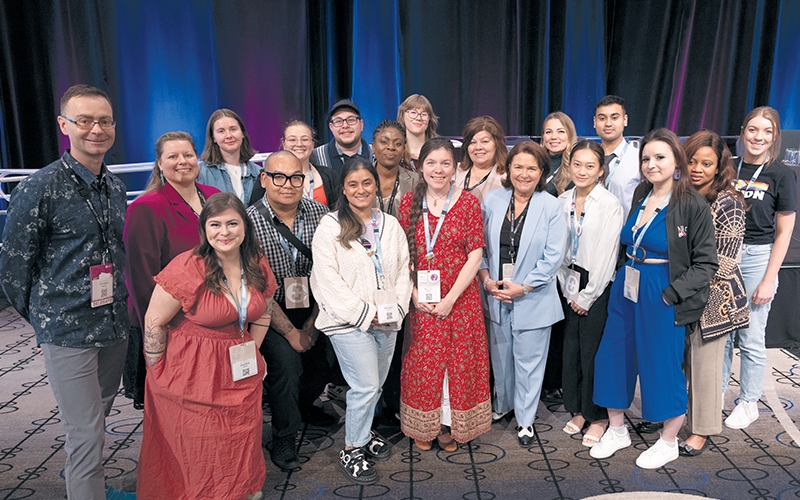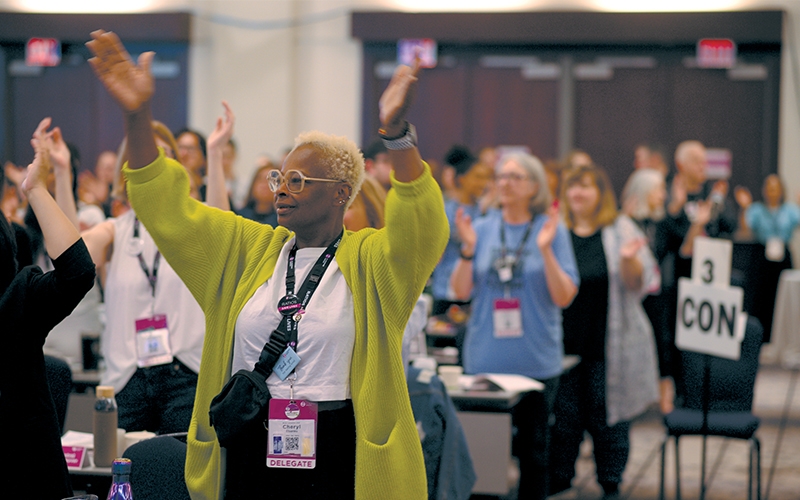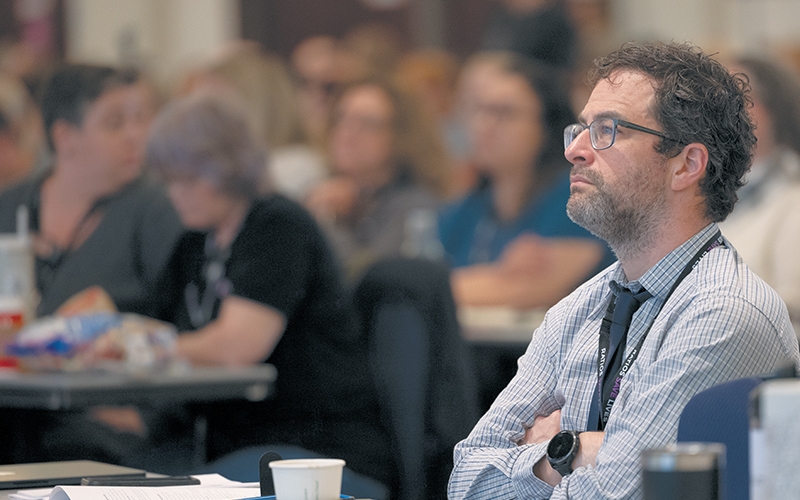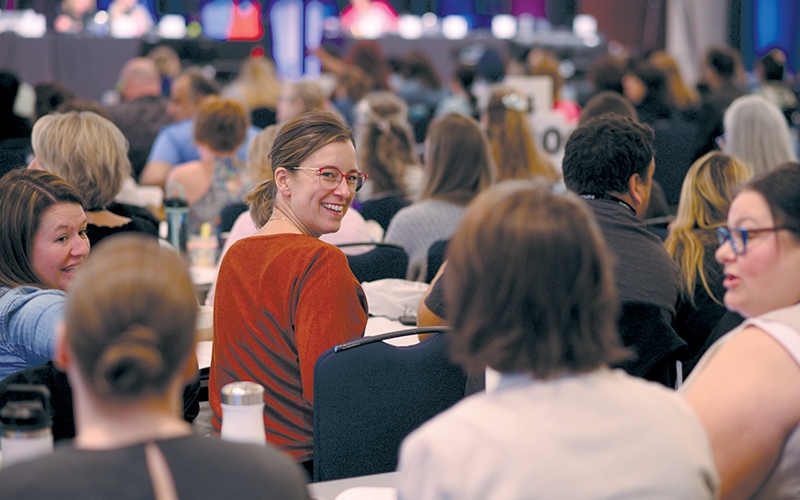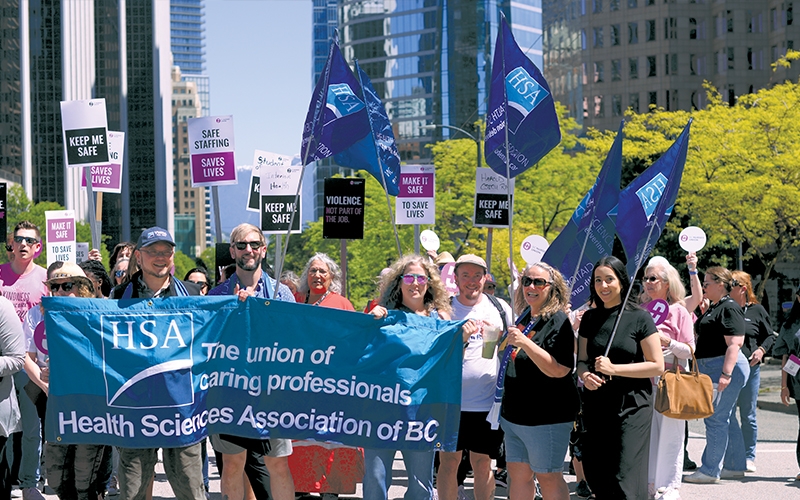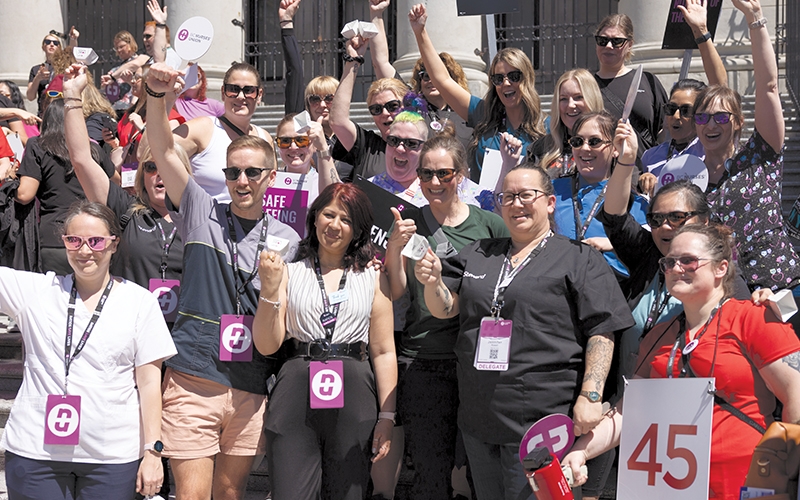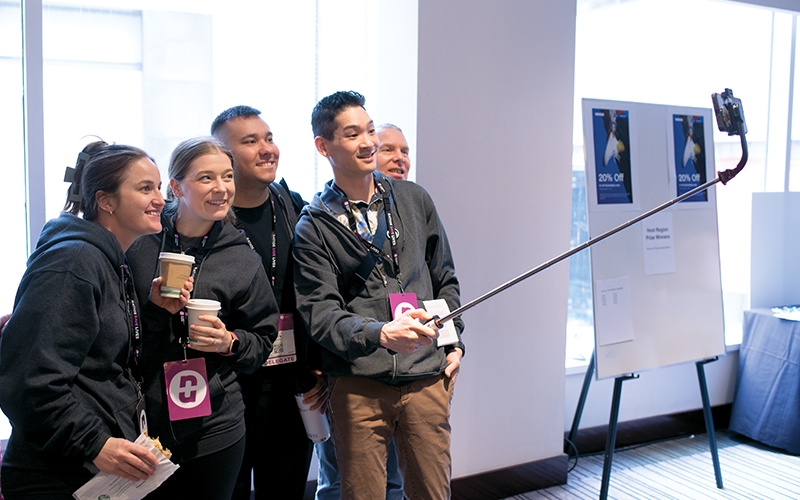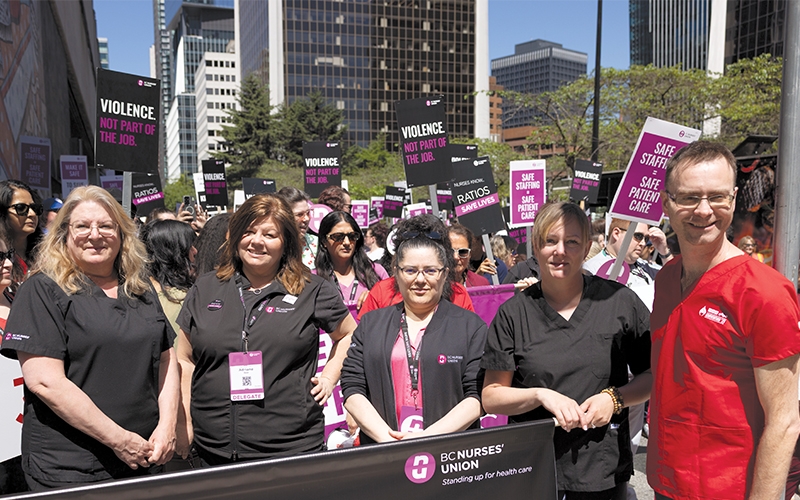 Bold, Committed and United
Bold, Committed and United
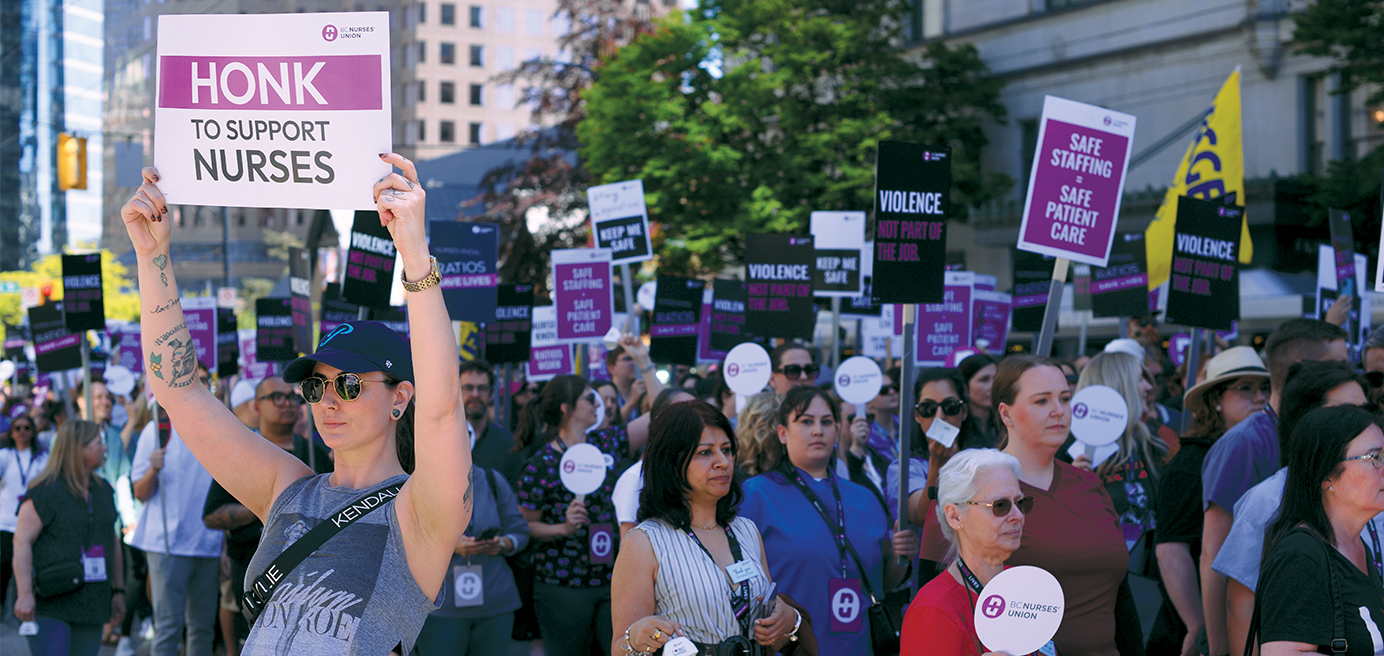
BCNU Convention 2025 opened in the early hours of May 26 on the unceded territory of the Squamish, Musqueam and Tsleil-Waututh nations at the Hyatt Regency Hotel. More than 500 delegates listened with rapt attention as Elder Martin Sparrow of the Musqueam Nation offered a traditional greeting and land acknowledgement, urging delegates to lead with respect, openness and honesty. His words set the tone for three full days of reflection, debate and unity.
BCNU President Adriane Gear followed with her report, beginning with her own territorial acknowledgement of the lands of the W̱SÁNEĆ people, where she lives and works. She outlined the major priorities that shaped her second year as BCNU’s leader: implementing minimum nurse-to-patient ratios, preparing for Nurses’ Bargaining Association (NBA) contract negotiations, strengthening member engagement and improving union governance alongside BCNU’s Council and Provincial Executive Committee.
“Representing more than 50,000 members is a tremendous responsibility,” she said. “But every day, the nurses of British Columbia inspire me. You are the reason I remain steadfast in my commitment to improving working conditions across our profession.”
Gear reaffirmed the union’s commitment to negotiating a strong collective agreement that protects nurses’ benefits, respects their professional contributions to the health-care system and addresses the chronic understaffing, unsafe workloads and workplace violence that too many nurses still face. She cited alarming WorkSafeBC statistics showing that time-loss claims for workplace violence among nurses nearly doubled in the past decade, from 25 per month in 2014 to 46 in 2023.
“Ratios are not just good policy – they are essential for the future of health care.”
- BCNU President Adriane Gear
Gear told delegates that BCNU has worked hard over the past year to improve the organization’s governance, establishing a new diversity, equity and inclusion working group and launching anti-Indigenous racism training initiatives. She outlined council’s five strategic priorities: increasing member access to information, cultivating member solidarity, governing the organization effectively, supporting professionalism and practice and enforcing member rights.
She applauded BCNU members’ work in cultivating partnerships and alliances that can help build stronger health care nationwide, spotlighting the union’s return to the Canadian Labour Congress and Vice President Tristan Newby’s appointment to the board of the Canadian Health Coalition. She also celebrated BCNU’s growing solidarity with other unions, including the support members showed for BC General Employees’ Union (BCGEU) and Canadian postal workers during recent job actions.
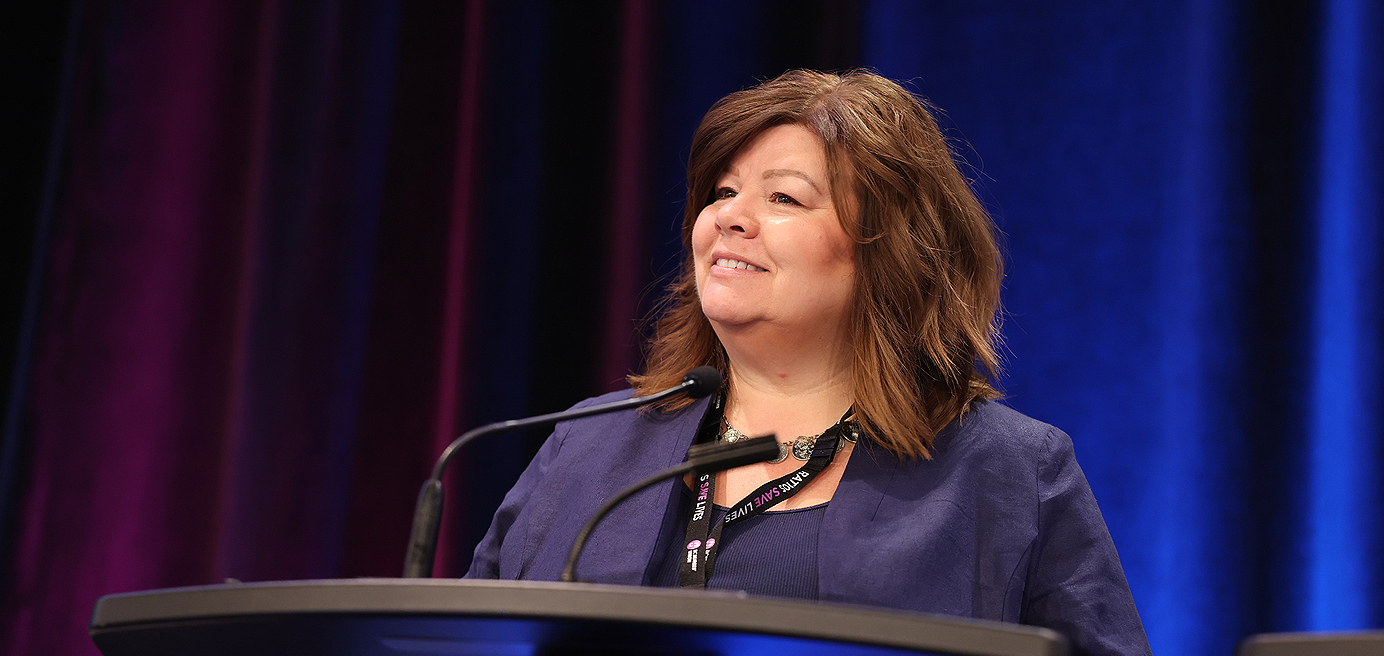
BOLD LEADERSHIP President Adriane Gear opens BCNU’s 43rd Convention.
Gear remarked that the union’s groundbreaking work to implement minimum nurse-to-patient ratios continues to garner international recognition.
“The world is watching BC,” she said. “BCNU is helping decision-makers and the public understand why ratios are not just good policy – they are essential for the future of health care.”
Gear closed with a rallying call to action, urging delegates to stay focused during convention and reminding them that their collective strength and advocacy will help implement ratios, secure a fair contract and ensure all BCNU members can work in a safe environment.
“We are the nurses of BC. We are fifty thousand strong, and we are bold, we are committed and we are united.”
VICE PRESIDENT'S REPORT
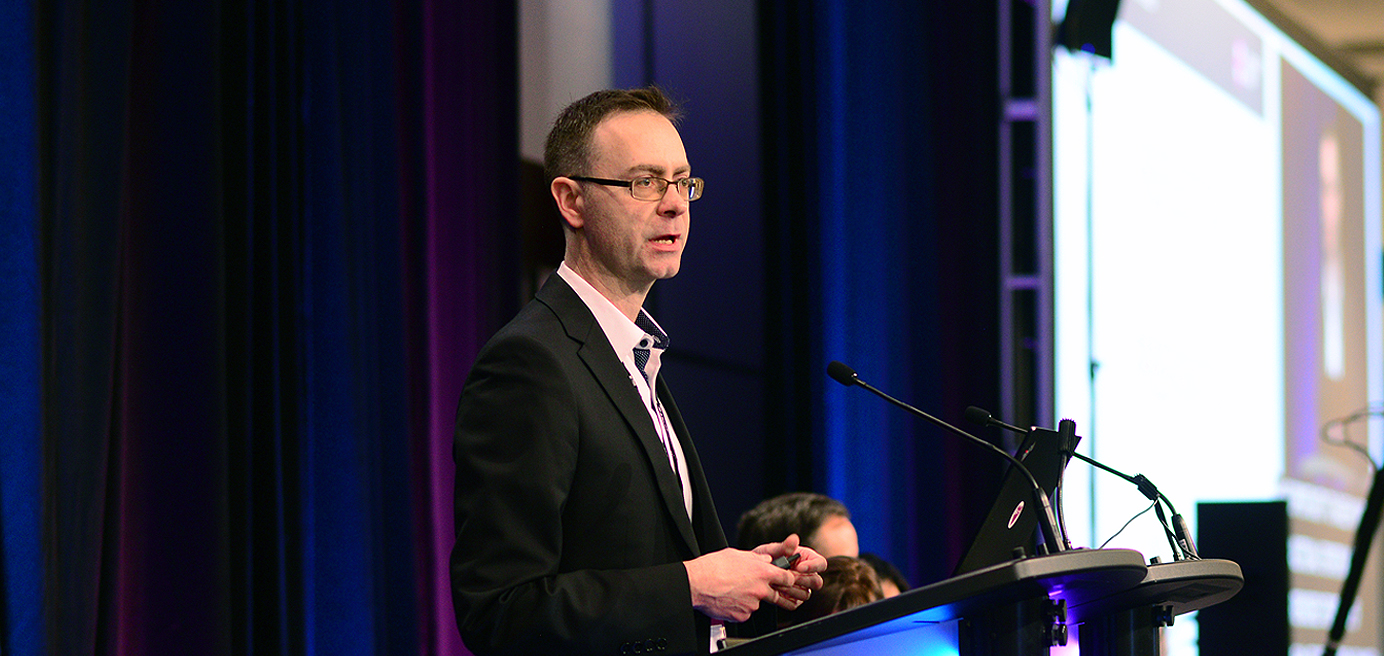
REACHING OUT BCNU Vice President Tristan Newby reported significant growth in outreach and engagement over the past year.
BCNU Vice President Tristan Newby began his remarks by challenging delegates to “be prepared, united and responsive – instead of reactive – when hard times come.”
“Be prepared, united and responsive, instead of reactive, when hard times come.”
- BCNU Vice President Tristan Newby
Newby said he focused on increasing member participation over the past year through decentralizing decision-making in the union’s equity caucuses and networks, making room for greater member participation, empowering activists and enhancing collaboration.
On the national stage, he reported that BCNU led a successful motion to increase funding for Indigenous nursing student scholarships from the Canadian Federation of Nurses Unions (CFNU). BCNU’s grassroots members continue to build bridges with members of other unions and increase solidarity.
Newby praised the vital work of regional lobby coordinators, who expanded their outreach to new levels this year, connecting with local elected officials, mayors, councillors and area directors across the province. They secured more than 118 pledges from candidates running in the 2024 provincial election to support minimum nurse-to-patient ratios. Newby said their hard work has helped educate the public and elected representatives about the promise of ratios and kept this policy solution in front of decision-makers.
Newby reminded delegates that they – and all BCNU members – can be a part of this critical work. He encouraged those in attendance to “choose to be the advocate, mentor and leader that you wish for at your worksite.”
BCNU IN STRONG FINANCIAL SHAPE
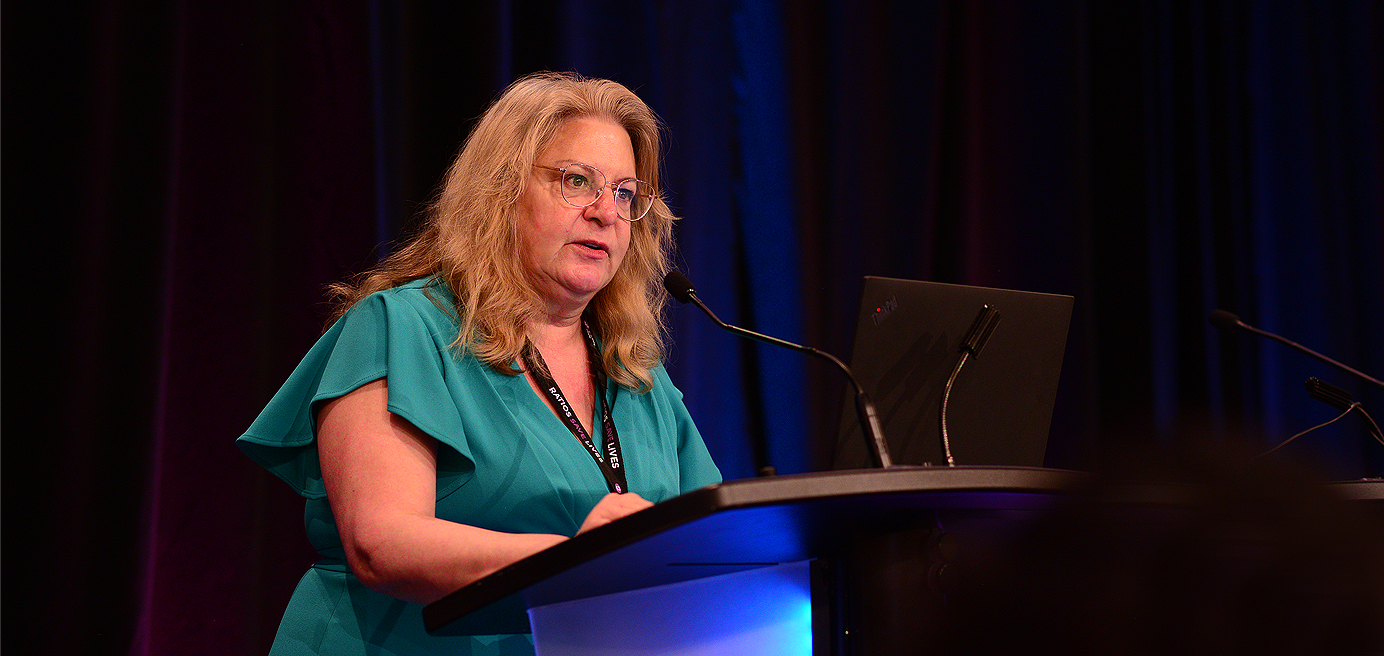
MONEY MATTERS BCNU Provincial Treasurer Sharon Sponton reported strong financial health in her Convention presentation.
Provincial Treasurer Sharon Sponton delivered BCNU’s annual financial report, noting that revenue increased in 2024 due to wage gains, growth in the number of members working full-time, the one-time transfer of the NBA Nurse Support Fund from the provincial government and union investment performance. She said the resulting 2024 operating surplus has been allocated to the Infrastructure Fund, the new Member Engagement and Steward Education Fund and the Bargaining Fund.
“As you can see, BCNU is in a strong financial position at the end of 2024,” she said.
Sponton commended the work of BCNU’s finance department, noting that it processed over 20,000 salary reimbursement days, along with tens of thousands of forms and payments.
Delegates viewed the complete list of BCNU’s funding and bursaries, including the new Strategic Priorities Education Fund Bursary and the CFNU Indigenous Student Nurse Education Bursary.
Sponton also reported on the significant financial support provided to members. As of May 2025, this has included $4.86 million for LPN to RN/RPN laddering, $2.46 million in NBA Hardship Assistance and $2.23 million for NBA Supplemental Mental Health Benefits.
She concluded by promoting the union’s new finance training module, encouraging delegates to learn about the union’s financial policies and processes, including salary reimbursement, union leave and various member expense policies.
“VIOLENCE IS NOT PART OF YOUR JOB”
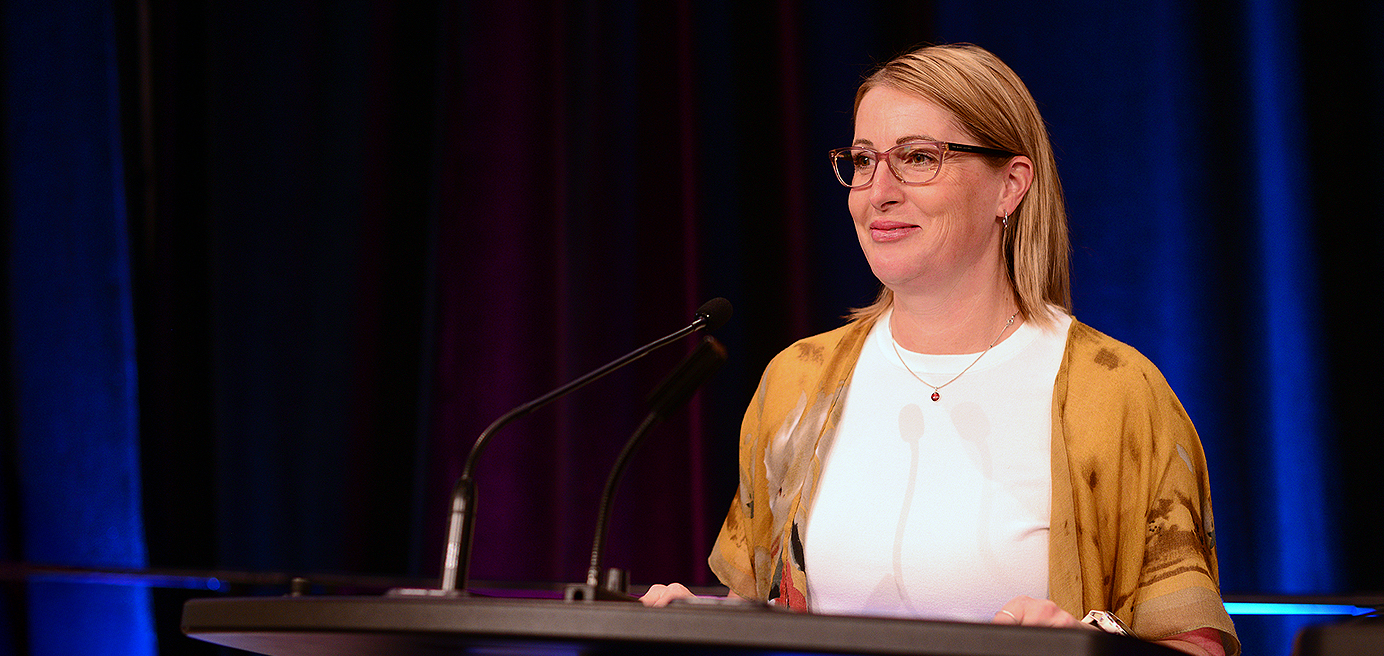
SAFETY FIRST Outgoing Executive Councillor Denise Waurynchuk reminded participants to report unsafe workplace incidents
Outgoing Interim Executive Councillor for Occupational Health and Safety and Mental Health, Denise Waurynchuk, opened her report by welcoming returning Executive Councillor, Aida Herrera, back to the role.
Waurynchuk reflected on the work she has undertaken in her portfolio over the past year, starting on a sombre note.
“We often have no idea what our co-workers are carrying behind their smiles and their uniforms,” she said. “The truth is some are quietly enduring more than we can imagine.”
She reminded delegates that NBA Hardship Assistance and the Supplemental Mental Health Benefit (SMHB) are both available to support members in need.
“Some members are on the brink of eviction, choosing between paying bills and buying groceries or starting over after leaving unsafe homes,” she said. “Others are facing serious illnesses, are unable to work and are barely staying afloat.”
Waurynchuk praised the tireless efforts of Enhanced Disability Management Program and Joint Occupational Health and Safety Committee representatives, as well as regional occupational health and safety reps and mental health advocates, in supporting nurses’ mental health and well-being across the province.
She called attention to the impact of the union’s Violence: Not Part of the Job, Break Down the Barriers and Stand up, Speak Out campaigns, which have shed light on the realities of violence in health care, helping to destigmatize psychological injury and demand lasting solutions to BC’s nurse shortage. She acknowledged that violence in the workplace is still of foremost concern.
“Let’s be absolutely clear: Violence is not okay. Violence is not part of your job,” Waurynchuk emphasized, adding that when workers act collectively, they create safer workplaces. She encouraged members to continue reporting health and safety issues, advocating for safer workplaces by contacting the Provincial Workplace Health Contact Centre, filing WorkSafeBC reports and speaking out to support one another.
“We remind the employer: safety is their job, and we’re watching.”
PROTECTING PENSIONS AND ADVOCATING FOR SENIOR NURSES
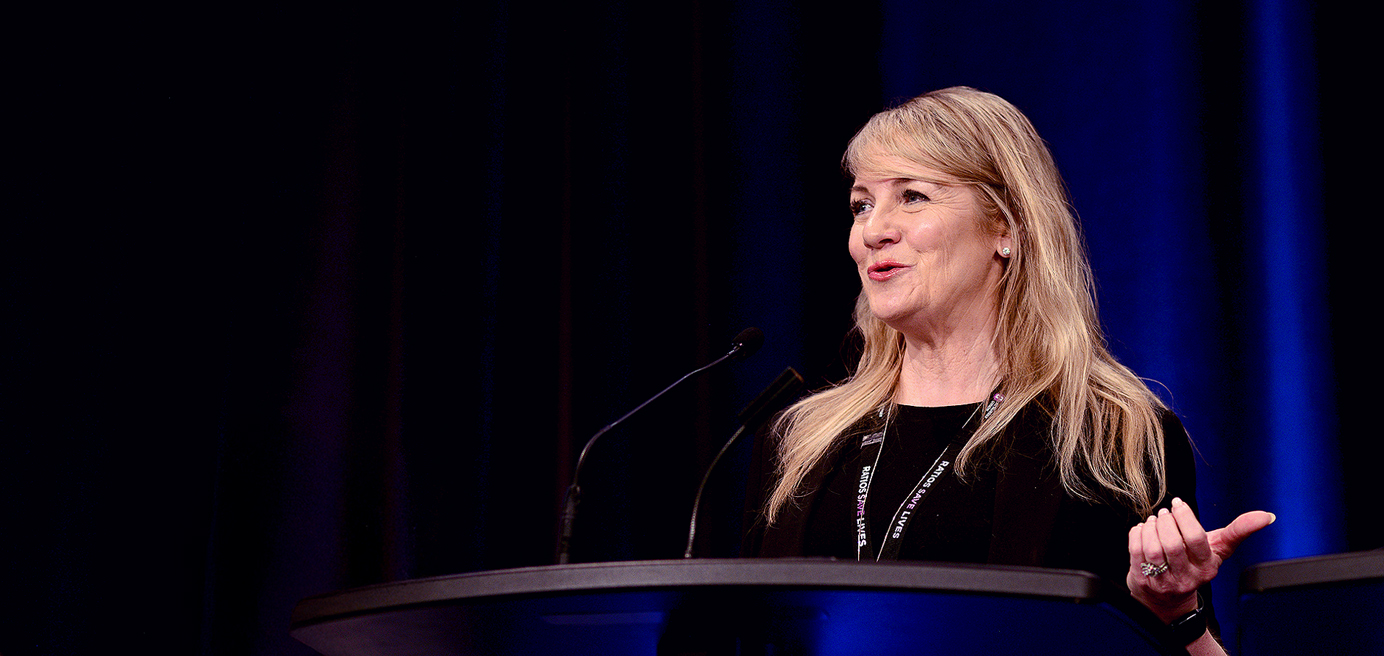
PLANNING AHEAD Outgoing Executive Councillor Meghan Friesen urged members to take BCNU’s pension workshops.
Interim Executive Councillor for Pensions and Seniors Health Meghan Friesen welcomed returning Executive Councillor, Michelle Sordal, back to the role while delivering reassuring news: both the Municipal and Public Pension plans remain well-funded.
“Both plans take a careful, long-term approach that avoids overreacting to short-term trends in the investment market,” she noted.
Friesen applauded the growing number of members attending the union’s pension workshops in the past year, emphasizing the importance of learning about pensions and planning for retirement.
Friesen also described the Seniors’ Strategy Committee’s recommendations to BCNU Council on retention and recruitment, skill mix, safe staffing levels, psychological health and safety and violence prevention for members working in long-term care, community and home support.
“The aging population, the need for safe and holistic care for seniors and the concerns of nurses make the existence of this committee invaluable,” she said.
Friesen announced the launch of the next phase of BCNU’s Not Okay campaign with a new survey of members working in long-term care. The results will inform the development of new minimum nurse-to-patient ratios in the sector, identify bargaining priorities and help build public awareness about conditions for members and their patients.
Lastly, she spoke about work underway to include LPNs in the NBA Retiree Benefits Program (RBP) and address issues
regarding the program’s future benefit designs.
Friesen concluded on a hopeful note, remarking that “the RBP committee is looking at long-term benefits that can be paid out to members that will address intergenerational equity issues while ensuring plan stability for years to come.”
CEO REPORT
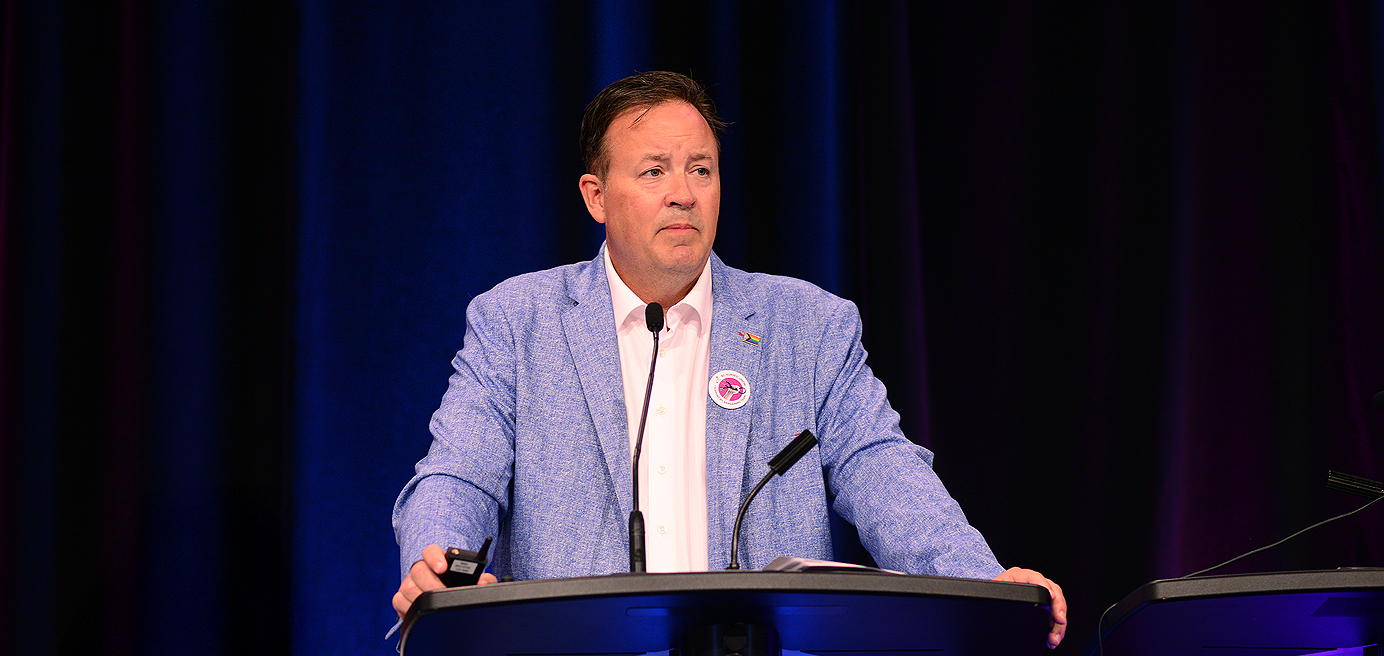
TEAM BUILDER BCNU CEO Jim Gould encouraged all members to get involved in bargaining.
BCNU CEO Jim Gould began his report with a portrait of his mother, Margaret, whose fierce advocacy inspired his approach to leadership.
“She taught me about standing up to bullies and the importance of having other people’s backs,” said Gould, telling delegates that he approaches his position as the union’s top staff member with the same spirit.
He outlined a vision for his role as BCNU’s CEO, saying that “the purpose that I have in this role is to improve the conditions for nurses in this province – end stop.”
Gould provided delegates with his assessment of the political context ahead of NBA contract negotiations, including a BC government budget deficit that now sits at $10.9 billion. While Gould acknowledged this number is concerning, he said members should not take it at face value.
“Show us the money that has not been spent,” he said, referring to ongoing shortages in nurse recruitment. “Show us the money. We’re going to be saying that a lot.”
The union has set five priorities for NBA bargaining, with benefits at the top of the list. Gould explained that members will have several opportunities ahead to provide input that will help guide the bargaining committee as it negotiates the future of NBA benefits, including upcoming town halls and a survey in the fall.
“Everybody has to embrace their power.”
- BCNU CEO Jim Gould
He told delegates that the union is in a strong position heading into negotiations after a series of bargaining conferences over the past year that engaged many first-time participants. Gould said that with a $75 million strike fund – the largest the union has ever had – members have the power to fight for what they deserve.
He shared details on the internal work at BCNU to foster excellence among staff, create a culture of learning and build the strongest nursing union in the world. Since assuming the role of CEO, he has strengthened internal processes, championed staff education and developed leadership capacity throughout the organization.
Concluding his presentation, Gould detailed the ways the organization is promoting a culture of collectivity and member engagement, leaving delegates with a challenge: “A tough road lies ahead, but you have the power. It’s time to embrace it.”
KEYNOTE SPEAKER CATHERINE KENNEDY: “YOU CAN DO THIS”
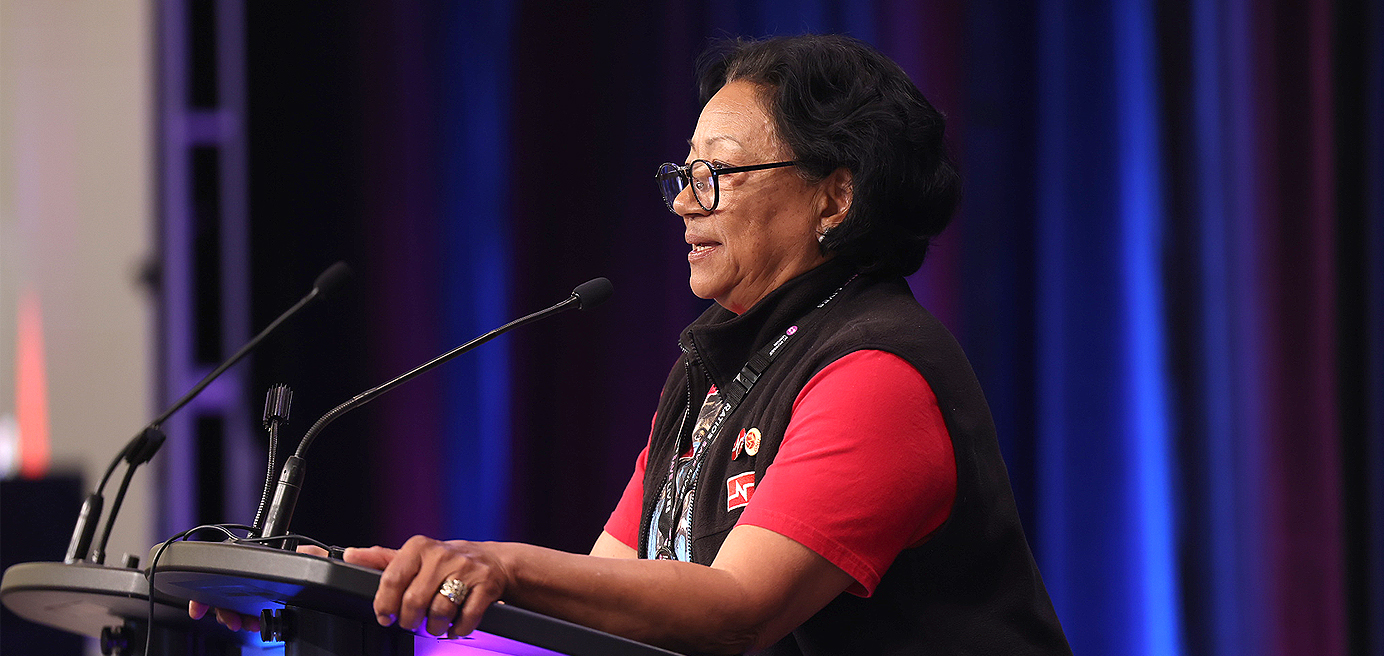
INTERNATIONAL INSPIRATION California Nurses Association President Catherine Kennedy shared California nurses’ experiences fighting for minimum nurse-to-patient ratios.
“Change is coming to British Columbia. Change is coming to BCNU.”
With these words, Catherine Kennedy, a registered nurse and President of National Nurses United and the California Nurses Association (CNA), wrapped up the first day of BCNU’s 43rd convention with a rousing keynote address.
A nurse for over 45 years, Kennedy spoke about the deep bonds between Canadian and American nurses, congratulating BCNU members on their fight for minimum nurse-to-patient ratios and calling the union a beacon of strength for nurses everywhere.
“Your fight is our fight – and we are with you every step of the way.”
- Catherine Kennedy
Kennedy detailed CNA’s hard-fought journey to implement safe staffing ratios in California – a battle that took more than a decade of grassroots organizing, member mobilization and political advocacy. She described the fierce opposition they faced from powerful hospital lobbies and political leaders, including former California governor Arnold Schwarzenegger, who attempted to roll back hard-won ratios. Nurses mobilized rapid response teams to protest at every one of his public appearances, forcing the government to back down. Despite political and corporate resistance, California’s nurses prevailed and helped spark similar movements in other states.
Kennedy reflected on her early days before ratios became law in her state, working as one of two nurses caring for 48 patients during a night shift. That experience – and the suffering it caused – taught her that safe staffing levels save lives, reduce stress and restore the humanity in nursing.
Looking ahead, she warned that global challenges like climate change and artificial intelligence pose serious threats to health-care systems and workers. She emphasized that legislated ratios are more important than ever to ensure that staffing levels remain safe and patients continue to receive high-quality care.
Kennedy closed her presentation urging BC nurses to “keep the fire alive,” reminding them that collective action and persistence are the keys to unlocking real change.
“You can do this,” she said. “Your fight is our fight – and we are with you every step of the way.”
LINDA SILAS: “YOU ARE CANADA'S NURSES”
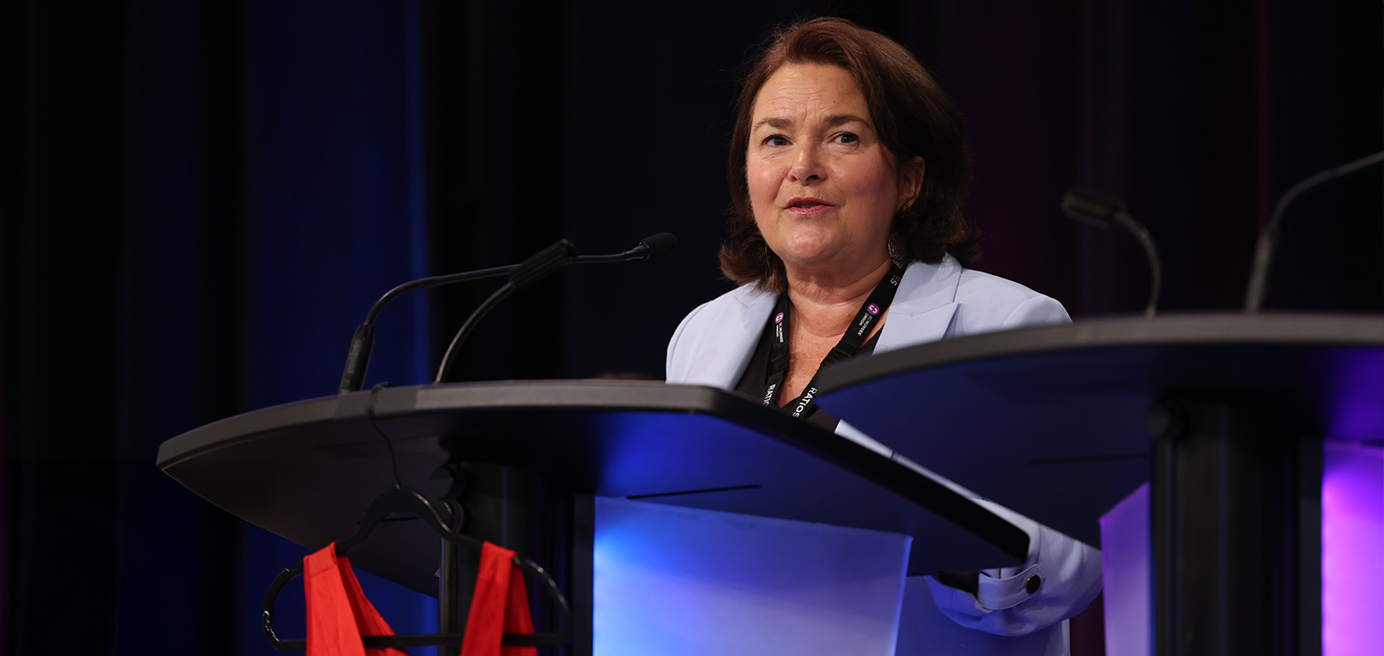
NATIONAL UNITY CFNU President Linda Silas told delegates that Canada’s nurses are with them.
Canadian Federation of Nurses Unions (CFNU) President Linda Silas opened BCNU’s second day of convention with an inspiring address that highlighted a year of advocacy, organizing and growing unity among nurses across Canada. Her message was clear: the power of the nursing movement lies not in one person – but in collective action.
Silas celebrated several milestones, including CFNU’s leadership in organizing the first-ever international summit on minimum nurse-to-patient ratios, held in Ottawa last November. The historic event brought together national and global nursing leaders, unions, government officials and health employers to strategize on implementing safe staffing in Canada. She also applauded BCNU President Adriane Gear’s recent opportunity to present to the Royal College of Nurses in Liverpool – a proud moment of international recognition for Canadian nursing advocacy.
Silas pointed to nurses’ political leadership, outlining CFNU’s national efforts during the federal election, which included putting pressure on federal leaders for a Patients’ Bill of Rights. This legal tool could help address unsafe health-care working conditions and enforce the core principles of the Canada Health Act, ensuring everyone has access to care through our public health-care system. She recapped high-level policy meetings with health ministers and premiers, as well as the CFNU’s ongoing advocacy for a national pharmacare plan and a national health human resources plan to enhance the retention and recruitment of nurses in Canada.
Highlighting CFNU’s role as a research leader, Silas cited recent studies on the barriers that internationally educated nurses experience, a national survey on the challenges facing nursing students and a comprehensive examination into anti-Indigenous racism in nursing. She shared plans for CFNU’s biennial convention in Ontario, which included an official apology to Indigenous, Métis and Inuit peoples and a critical debate on the war in Gaza.
Silas urged nurses to say “no” to unsafe conditions and burnout and to say “yes” to a future rooted in empowerment and unity. She reminded delegates of the power of solidarity, pointing to key moments in labour history such as Manitoba’s 31-day strike in 1990 and BC’s overtime ban in 2001.
Silas closed with a bold call to action: “From Kamloops to Charlottetown, we need a grassroots nursing movement that connects every nurse in every corner of the country. We need to work together and make sure our message is loud. You are Canada’s nurses.”
DELEGATES DEBATE BYLAW AMENDMENTS
Delegates took part in vibrant discussions on three proposed amendments to BCNU’s Constitution and Bylaws on day one of convention.
The group passed an amendment to Article 8, granting convention delegate status to members of the Truth and Reconciliation Committee.
A proposed amendment to Article 5, which would have barred members who have ever been deemed not in good standing from running for Provincial Executive Officer or Regional Council Member positions, was defeated.
Delegates also rejected a proposed amendment to Article 8 that would have increased the number of BCNU convention delegates and alternates for regions with more than 4,000 members.
Delegates voted in favour of a resolution to increase regional council member remuneration to the equivalent of level 5/step 10 of the NBA wage grid. A separate resolution to increase the annual council stipend to $16,000 was defeated.
CONVENTION REPORTS
Delegates reviewed two expert reports during convention. The first, an election review presented by Ian Cullwick, a specialist in governance effectiveness, recommended the union adopt a delegated voting structure among other changes. Delegates did not hold a vote to accept the report.
The second, a compensation inquiry conducted by investigators Judi Korbin and Megan Ashbury, recommended that regional council members be precluded from remunerative work in the health sector, and that BCNU increase council compensation. Delegates voted to reject the report.
RALLY TO END TO WORKPLACE VIOLENCE
“We are done being quiet. We are done being told that violence is just part of the job,” declared BCNU President Adriane Gear from the steps of the Vancouver Art Gallery on the final day of BCNU’s annual convention.
“We are done being quiet We are done being told that violence is just part of the job.”
- BCNU President Adriane Gear
Gear addressed a crowd of more than 500 nurses and supporters who took to the streets of Vancouver demanding that health employers keep nurses and all health-care workers safe from violence. The group shut down traffic at the intersection of Burrard and Georgia before proceeding to the art gallery, drawing a chorus of supportive honks from passing vehicles.
BCNU Vice President Tristan Newby welcomed nurses from every health authority in the province and the many allies in attendance, including CFNU President Linda Silas, Saskatchewan Nurses’ Union Vice President Denise Dick, Health Sciences Association of BC President Sara Kooner, BC General Employees’ Union President Paul Finch and Michelle Reyna from National Nurses United.
Silas delivered sobering statistics from CFNU’s national survey on workplace violence: 65 percent of BC nurses had experienced violence in the workplace in the past year. She demanded action to end the crisis. “These violent acts are crimes, and the perpetrators need to be charged.”
“Enough is enough! Because if you don’t have safe nurses, you don’t have safe patients!”
- Janice McCaffery
Gear took to the podium after Silas, standing in front of a backdrop of 46 nurses holding placards symbolizing the average number of BC nurses filing WorkSafeBC time-loss injury claims each month. She emphasized that most violent incidents don’t make the news – they occur behind closed doors, in empty hallways and in long-term care homes.
“These numbers don’t even capture the daily incidents, the threats, insults and being spat on,” added Gear. “This would not be tolerated in any other profession.”
The rally’s most powerful moment came when Janice McCaffery, an emergency nurse from Surrey Memorial Hospital, shared her story of surviving a violent assault on the job that ended her 40-year nursing career. “I have no idea why they did it,” she said. “But it gave me a brain bleed, a severe concussion – and my career is over.”
Gear said McCaffery’s experience is why health authorities need to stop ignoring the violence in their facilities and do their job. She closed with a clear message: “Enough is enough! If you don’t have safe nurses, you don’t have safe patients!”
DELEGATES DEBATE RESOLUTIONS
Delegates debated eight important resolutions on the final day of convention, voting in favour of two while rejecting six.
Delegates voted in favour of a resolution to increase the number of funded seats at the annual human rights and equity (HRE) conference from 180 to 280. They also carried a resolution calling for future HRE bargaining conferences to be held in person.
Delegates rejected six resolutions that called on the union to:
- Appoint EDMP representatives to three-year terms.
- Expand the annual HRE conference to two days with salary replacement.
- Move responsibility for approving regional HRE caucus and network budgets to the respective provincial caucus or network chairs and change the funding for regional caucuses and networks to provincial.
- Move HRE Committee oversight from the Vice President to the Executive Councillor for Pensions and Seniors’ Health.
- Create a diversity, equity and inclusion labour relations officer role.
- Form an LPN network using existing HRE network funding.
GEAR CALLS ON DELEGATES TO REMAIN UNITED
In a powerful closing address, President Gear reflected on delegates’ renewed determination, inspiration and solidarity. She thanked delegates for their energy and engagement, calling the event a turning point in BCNU’s fight for safer and more inclusive workplaces.
Gear thanked CFNU President Silas and National Nurses United President Kennedy for their messages of courage, struggle and action. She said their stories reminded delegates that they are not alone in their fight for improved working conditions for nurses.
She praised delegates for their passion at the rally, saying it sent a clear message to employers and the government that nurses deserve to feel safe at work. She thanked union members from the BCGEU and the Health Sciences Association of BC for helping to showcase the collective strength of health-care workers and underscore the urgent need for meaningful change.
Gear called on delegates to return to their workplaces ready to organize and prepare their fellow members for bargaining.
“Share what you’ve learned over the past three days with your colleagues and co-workers,” she urged. “We need the support and unity of every BCNU member if we are going to be successful in bargaining – and I know we will.”
In closing, Gear encouraged nurses to leave with their heads held high, their voices loud and their solidarity strong.
“Thank you again for an incredible convention,” she said. “Let’s bring this energy and inspiration back to our communities and into the future we’re building together.”
UPDATE (Summer 2025)
2025 BCNU LEADERSHIP AWARDS
Each year, BCNU honours two members who show exemplary leadership and advocacy in their nursing careers.
This year, union president Adriane Gear presented the NU Leader Award to Vancouver Metro region member Abbey Glowicki, a registered nurse at St. Paul’s Hospital, known for her passion for working with surgical patients and the young adult population.
Gear presented the Excellence in Leadership and Advocacy Award to Central Vancouver region member Jessica Machado, a registered nurse at Vancouver General Hospital and occupational health and safety representative for her region.
